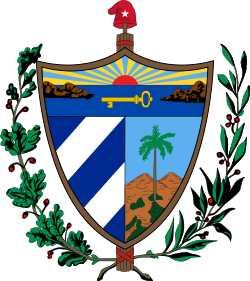| Vice President of the Republic of Cuba | |
|---|---|
| Vicepresidente de la República de Cuba (Spanish) | |
 | |
| Council of State | |
| Style | Mr Vice President (informal) His Excellency (diplomatic) |
| Member of | Council of Ministers |
| Residence | Palacio de la Revolución |
| Appointer | National Assembly of People's Power |
| Term length | Five years, renewable once [1] |
| Formation | 2 December 1976 |
| First holder | Raúl Castro |
 |
|---|
The vice president of Cuba, previously the vice president of the Council of State between 1976 and 2019, is the second highest political position obtainable in the Council of State of Cuba. Currently there is a provision for several vice presidents, who are elected in the same manner as the president of Cuba.
Contents
- List of officeholders
- Vice presidents of the Republic in Arms (1869–1899)
- Vice presidents of the Republic (1902–1959)
- First vice presidents of the Council of State (1976–2019)
- Vice President of the Republic of Cuba (2019–present)
- See also
- References
Historically, the vice president of Cuba was elected in the same ticket with the president. The position has been in use 1902–1928, 1936, 1940–1958, and since 1976.



















